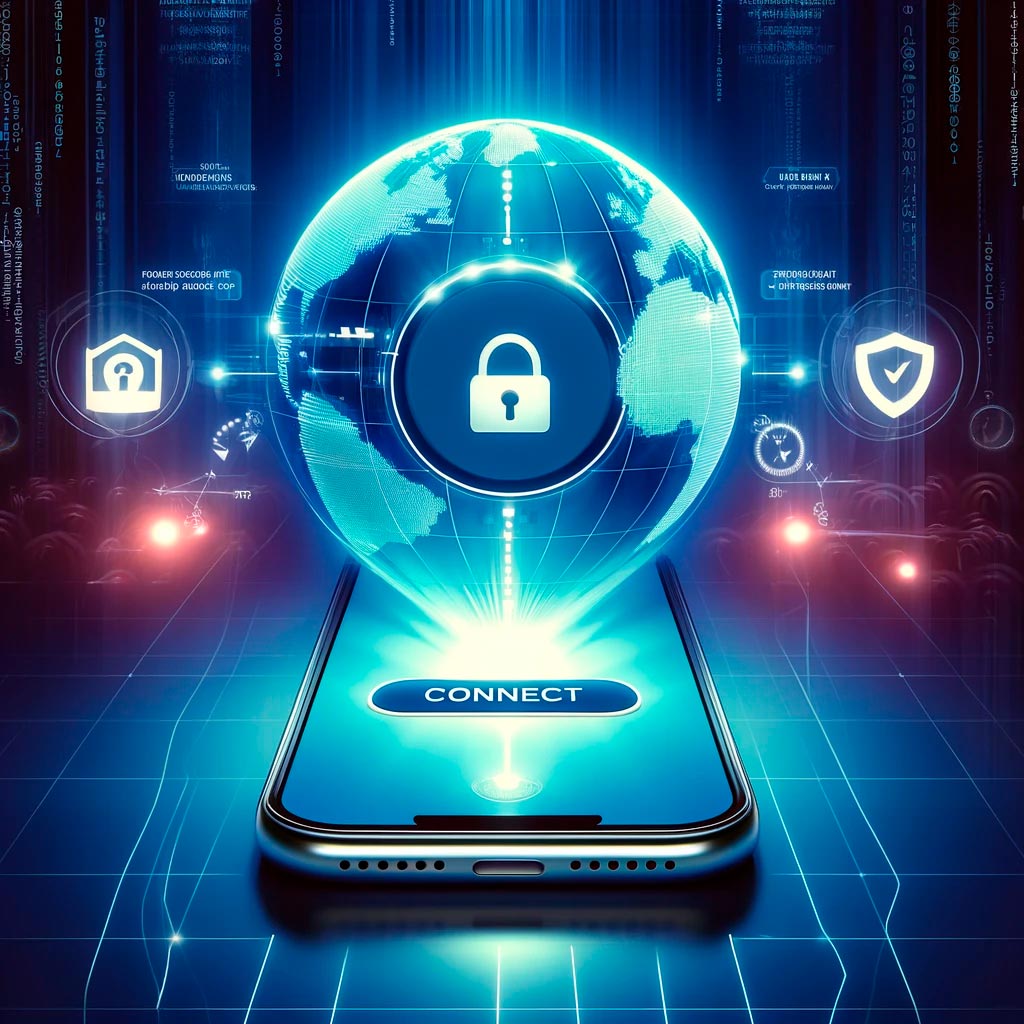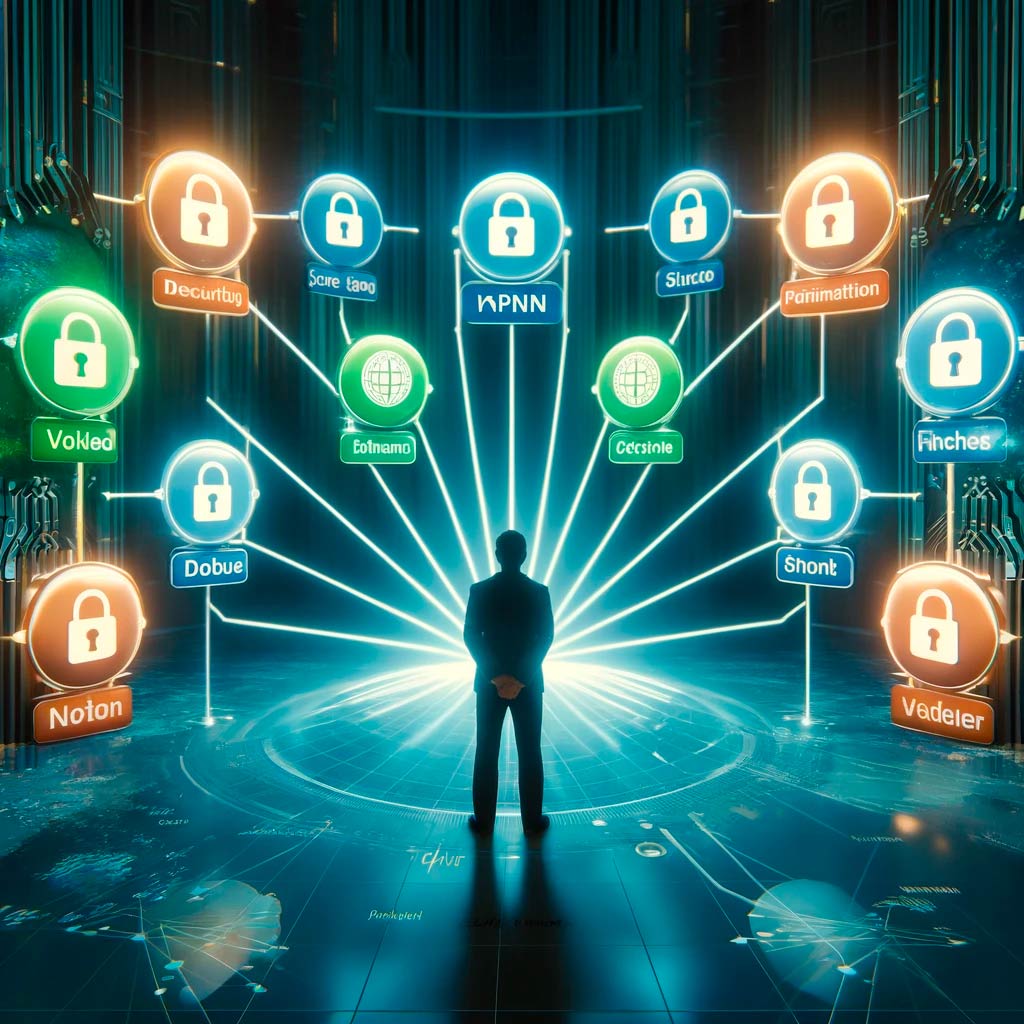Содержание
In the era of digital information, where every online step can be tracked and privacy becomes increasingly elusive, using a VPN (Virtual Private Network) transitions from being a “nice-to-have” to a “must-have.” A VPN not only protects our data from unauthorized access but also provides freedom on the internet by bypassing geographical restrictions and censorship. In this context, a VPN acts as a reliable tool for ensuring security and maintaining privacy in the vast web, offering users peace of mind and control over their information in an unstable digital world.
Data Protection
Encryption of Data: At the core of VPN operation is data encryption, which transforms your information into an encrypted code during transmission over the internet. This means that even if the data is intercepted, it is extremely difficult to decrypt without the appropriate key.
Hiding IP Address: A VPN masks your real IP address, replacing it with the IP address of the VPN server. This not only allows you to bypass geographical restrictions and censorship but also protects your identity online, making you an anonymous user.
Protection from Data Leaks: Many VPNs come with built-in features to protect against DNS and IP leaks, ensuring that your real IP address remains hidden even in the event of VPN connection failures.
Secure Use of Public Wi-Fi Networks: Public Wi-Fi networks are often vulnerable to hacker attacks, but with a VPN, your online activity and data transmission are encrypted, significantly reducing the risk of cyberattacks.
Protection from ISP Surveillance: A VPN prevents your internet service provider from tracking and recording your online activities, which is crucial for maintaining the privacy of your online searches and visited sites.
Bypassing Blocks and Censorship: By using VPN servers located in different parts of the world, users can bypass government censorship and access blocked resources, while maintaining the confidentiality of their online presence.
Protection from Tracking and Profiling: Since a VPN hides your identity and geolocation, it makes it difficult to collect data on your online activity for tracking and creating advertising profiles.
Bypassing Geo-Restrictions
Access to International Streaming Services: With a VPN, you can access content libraries of streaming platforms such as Netflix, Hulu, BBC iPlayer, which may differ by country. This opens up a wide range of movies, TV shows, and programs that were previously unavailable in your region.
Bypassing Internet Censorship: In some countries, governments impose strict internet censorship by blocking access to certain websites and services. A VPN allows you to circumvent these restrictions, providing freedom of information and access to blocked resources.
Access to Regionally Restricted Games and Services: A VPN can also be used to bypass geographical restrictions in online games and other internet services, allowing access to early releases or regionally limited content.
Participation in International Deals and Discounts: Sometimes online stores and services offer promotions and discounts available only to certain regions. With a VPN, you can take advantage of these offers without being physically present in the corresponding geographic location.
Access to Academic and Scientific Resources: Some educational and scientific platforms may restrict access to their resources for users from certain countries. A VPN helps bypass these restrictions, promoting the free exchange of knowledge and information.
Enhanced Privacy During Information Searches: Using a VPN to bypass geo-restrictions also aids in protecting your privacy by hiding your real location and preventing tracking of your search queries by search engines and websites.
Secure Use of Public Wi-Fi
Data Interception: One of the main threats when using public Wi-Fi is the possibility of data interception by hackers. Your logins, passwords, banking information, and other sensitive data can be stolen.
Man-in-the-Middle (MitM) Attacks: In such attacks, an attacker can position themselves between you and the access point, intercepting and modifying transmitted information. This can lead to data theft or malicious attacks.
Fake Wi-Fi Networks: Hackers can create Wi-Fi networks with names similar to legitimate public networks, trapping unsuspecting users.
Malware: Vulnerabilities in public Wi-Fi networks can allow malicious software to be downloaded to your device, causing damage or giving attackers remote access to your device.
Surveillance and Tracking: Your online activities, such as visited sites and internet searches, can be tracked when connected to public Wi-Fi, threatening your privacy.

How VPN Protects You on Public Wi-Fi Networks:
Traffic Encryption: VPN encrypts all your internet traffic, making it incomprehensible to attackers even if intercepted. Protection from MitM Attacks: Data encryption also protects against MitM (Man-in-the-Middle) attacks, preventing the interception and alteration of data. Anonymity: Hiding your IP address and encrypting data helps ensure anonymity online, protecting against surveillance and tracking. Protection from Fake Wi-Fi Networks: Using a VPN helps secure your connection, even if you’re connected to a fake Wi-Fi network, as all your traffic remains protected regardless of the network.
Internet Anonymity
Hiding Your IP Address:
Identity Protection: When you use a VPN, your real IP address is replaced by the VPN server’s IP address. This means your online actions can’t be directly linked to your actual location or identity. Tracking Complexity: Hiding your IP address makes it harder for websites, advertisers, and potential attackers to track your online activities and build a profile of your behavior.
Hiding Your Location:
Bypassing Geographical Restrictions: Using a VPN allows you to choose servers in different countries, effectively “masking” your location, granting access to content blocked in your actual region. Protection from Geo-targeting: Hiding your location also prevents targeted ads based on geolocation, giving you greater control over what information is collected about you online.
Protection from Surveillance and Monitoring:
Difficulty for ISPs: Internet Service Providers cannot monitor your internet activity when using a VPN, providing an additional level of privacy. Protection from Government Surveillance: In countries with strict internet control, a VPN can help protect personal information from government access.
Enhanced General Security
Public Wi-Fi Network Security: VPN protects your personal and financial information when connecting to unsecured public Wi-Fi networks, preventing data interception by attackers. Protection from Digital Profiling: Using a VPN makes it harder to create an accurate digital profile based on your online activity, as your identity and location remain anonymous.
Protection from Surveillance
Protection from Internet Service Providers:
Data Encryption: VPN encrypts all user internet traffic, making it unreadable to outsiders, including your ISP. This means the ISP cannot track your online activities or sell your browsing history for targeted ads. Hiding Browser History: All requests sent through a VPN are hidden from ISPs, ensuring privacy for your searches and visited websites.
Protection from Government Surveillance:
Bypassing Surveillance: A VPN can help bypass government surveillance, hiding your internet activity from government agencies. In countries with restricted internet freedom, this is especially important for accessing uncensored information and free communication. Anonymous Protection: By changing your IP address, a VPN makes you anonymous online, making it harder for government agencies to identify or track your location and activities.
Enhanced Privacy on Public Wi-Fi Networks:
Protection in Public Networks: When connected to public Wi-Fi, a VPN prevents anyone from spying on your internet activity, as your data is transmitted in encrypted form.
Protection from Tracking and Profiling:
Reduced Profiling Risk: Since a VPN hides your internet activity, it also makes it harder to create a detailed profile of your interests and habits for advertisers and other third parties.
Protection from DNS and IP Leaks:
Leak Protection: Many VPNs offer built-in protection against DNS and IP leaks, ensuring your real IP address remains hidden even in the case of technical failures.
Improving Connection Speed
Bypassing ISP Throttling:
Hiding Traffic from Your ISP: VPN encrypts your internet traffic, making it unrecognizable to your ISP. This means your provider can’t identify the type of traffic (e.g., video streaming) and, therefore, can’t apply speed restrictions. Preventing Traffic Discrimination: Without the ability to identify traffic, ISPs cannot prioritize or limit the speed of certain online activities, which may lead to improved overall connection speed.
Choosing the Optimal Server:
Servers Closer to the Target: Sometimes, connecting through a VPN server located closer to the target website or service server than your ISP can improve loading speeds by reducing delays and improving data routing. Reducing Network Overload: Choosing a less congested VPN server can also help reduce latency and increase speed, especially during peak hours.
Improving Speed in Restricted Internet Regions:
Bypassing Local Restrictions: Some countries or regions may impose internet speed restrictions for certain services or international websites. A VPN can help bypass these limitations, providing access to a broader and faster international network.
Protection from Network Overload:
Bypassing Overloaded Nodes: Using a VPN can allow your traffic to bypass overloaded nodes in your provider’s network, especially if the VPN uses a more efficient data route.
Accessing Blocked Websites
Bypassing Government Censorship:
Access to Restricted Information: In countries with strict internet surveillance and censorship, a VPN allows users to safely access blocked content, including news sites, social media platforms, and messaging services. Anonymous Communication: A VPN protects user identity, allowing them to share information and express their views without fear of repression.
Access to Geo-restricted Content:
Streaming Services: VPN allows bypassing geographical restrictions imposed by streaming platforms like Netflix, BBC iPlayer, and Hulu, granting access to a wide range of content unavailable in certain regions. Gaming Services: Gamers can use a VPN to access games and servers blocked in their country or for early access to games that have not yet been officially released in their region.
Access to Corporate-blocked Websites:
Bypassing Workplace Restrictions: Employees can use a VPN to bypass restrictions on accessing certain websites at work, such as social networks or personal email services, while keeping their activity hidden from corporate network security.
Protection from IP-based Blocking:
Changing IP Address: VPN allows you to change your IP address, preventing access blocking based on your actual geographic location or previous online activity that may have led to an IP block.
Protection from Phishing and Fraud
Data Encryption:
Protecting Personal Information: VPN encrypts your internet traffic, making it extremely difficult for attackers to intercept sensitive information such as logins, passwords, and financial data. Safe Use of Public Wi-Fi Networks: Public Wi-Fi networks are a common place for phishing attacks. A VPN prevents data interception on such networks.
Hiding IP Address and Location:
Anonymity Online: Masking your real IP address makes it harder for attackers to track your online activity or determine your location for targeted phishing attacks. Protection from Targeted Phishing: Hiding your location also helps avoid geo-targeted phishing attacks, which may be used to impersonate local services or organizations.
Secure Access to Websites:
Connection Safety Check: Some VPNs offer built-in security features, such as checking websites for malicious content or alerting about suspicious sites, providing extra protection from phishing sites.
Protection from Data Leaks:
Built-in DNS and IP Leak Protection: These features ensure your real IP address and domain name requests don’t leak through unsecured channels, which could expose your identity and increase phishing risk.
Maintaining Privacy While Searching the Web:
Minimizing Tracking: Limiting the information available to third parties about your online activity helps reduce unwanted ads and spam, including phishing emails.
Managing Digital Footprint
Hiding IP Address and Location:
A VPN masks your real IP address, replacing it with the VPN server’s IP address. This means that websites and third parties cannot easily track your real location or tie your online activity to your personal IP address. Changing your IP address also makes it harder for websites and advertising agencies to create an accurate profile of your interests based on your location.

Although a VPN itself doesn’t block cookies, it can be used in combination with browser privacy settings and extensions to block tracking cookies, reducing the amount of information collected about you. Using a VPN in your browser’s private mode prevents the storage of browsing history and search queries, further minimizing your digital footprint.
Protection from Internet Service Provider (ISP) Tracking:
Your ISP can track and record the websites you visit and use this information for targeted ads or sell your data to third parties. A VPN encrypts all traffic, making your online activity invisible to the provider.
Minimizing Workplace Traces:
Using a VPN can also hide your internet activity from network administrators in your workplace network, preventing possible monitoring and storing of your online activities at work.
Reducing the Risk of Profiling and Targeted Ads:
Reducing the visibility of your online activity makes it harder for advertisers to create detailed profiles of your interests and preferences, which leads to a reduction in the amount of targeted and personalized advertising.
Ease of Use and Versatility
User-Friendly Interfaces:
Most modern VPN services offer apps with user-friendly, intuitive interfaces, allowing users to connect to the VPN with just a few clicks or taps. VPN apps often include a “one-click connect” feature, automatically selecting the optimal server for the best speed and connection stability.
Cross-Platform Compatibility:
VPN apps are available for all major operating systems, including Windows, macOS, Linux, Android, and iOS, allowing you to use the same VPN account on different devices. Some VPN services offer extensions for popular web browsers like Chrome, Firefox, and Safari, providing even more convenient access to secure connections directly from your browser.
VPN for All Devices:
Multiple Simultaneous Connections: Most VPN providers allow the use of one account on multiple devices at the same time, making it perfect for protecting all your devices without needing to purchase additional subscriptions. Support for Various Devices: Beyond traditional computers and smartphones, many VPNs also support other types of devices, such as routers, smart TVs, and gaming consoles, extending protection to your entire home or office internet traffic.
Ease of Setup:
For most users, connecting to a VPN requires no specialized knowledge or complicated setup. After registering for the service, simply download and install the app, log into your account, and choose a server to connect. For advanced users, many VPNs offer additional settings and options, such as choosing encryption protocols, configuring a kill switch, or selecting servers for specific tasks (e.g., streaming or torrents).
In conclusion, using a VPN is critically important for ensuring security, privacy, and freedom on the internet. It allows you to protect yourself from surveillance, phishing, and fraud while bypassing geographical restrictions and censorship, providing access to blocked content. Thanks to its ease of use and versatility, VPNs are suitable for a wide range of devices, making them accessible to every user. Minimizing your digital footprint and improving connection speeds are additional benefits that make VPNs an indispensable tool in today’s digital world.



Комментарии к статье